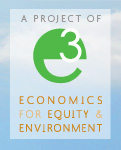In 2009, I published a book with Graciela Chichilnisky, Saving Kyoto (New Holland 2009), that argued passionately for preserving the economic and political architecture of the only international treaty on climate change the world has known – the Kyoto Protocol. The book was timely: the countdown to compliance with Kyoto’s mandated emissions targets had begun; the international community was gathering that year in Copenhagen to negotiate the next round of climate commitments; and there was hope that the Obama administration could usher the U.S. back to the negotiating table in earnest. More importantly from my perspective, however, was the growing realization that the window of opportunity for stabilizing the earth’s climate system was rapidly coming to a close. The urgency of the crisis demanded immediate, extensive emissions reductions. And I firmly believed that a coordinated international effort that mandated reductions from world’s largest emitters was the fairest and most efficient way to stave off climate disaster.
This year marks the 20th anniversary of the famous Earth Summit in Rio de Janeiro and the signing of the United Nations Framework Convention on Climate Change (UNFCC), the international governance framework that eventually gave rise to the Kyoto Protocol. As the global community convenes again this week in Rio to establish goals and strategies for sustainable development for the next 20 years, its failures to arrest climate change over the last 20 years will be hard to deny. But it will also be hard to ignore the real energy, innovation, and progress around climate change that is emerging from the ground up all over the world. The examples are many, including Germany’s aggressive use of feed-in tariffs that is helping to drive down the costs of solar technology worldwide; the commitments of cities across the globe to redesigning their infrastructure, planning, and policies to dramatically slash emissions; and the emergence of regional emissions reduction schemes, such as California’s AB32 and the Northeast’s Regional Greenhouse Gas Initiative. Even private industry is taking positive leaps forward toward embracing energy savings and preparing for future uncertainties around climate change and global energy prices (more…)

